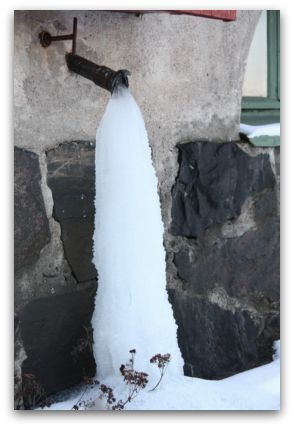“It’s snowing still,” said Eeyore gloomily.
“So it is.”
“And freezing.”
“Is it?”
“Yes,” said Eeyore.
“However,” he said, brightening up a little, “we haven’t had an earthquake lately.”
-A. A. Milne, The House at Pooh Corner
It’s only the first week of November and here in PA we’ve already had our first snow of the season. Much as I like to pretend it’s not happening, winter is coming, and with it cold temperatures, high winds and more chances to play Laura Ingalls Wilder.
Since we tend to lose power a LOT here in our little farmhouse at the edge of suburbia (doesn’t quite have the same ring as little house on the prairie, does it?) one of our more pressing concerns is making sure the pipes don’t freeze and burst, making for a messy business when the cold snap breaks or the heat turns back on. I’m assuming we’re not the only ones with this problem, so here are some tips courtesy of my plumber husband and my BFF, Google search.
How to Prevent Pipes from Freezing
DO:
- Reroute any pipes that are of particular concern (outdoor or exposed in an uninsulated space). Don’t have the cash for that right now? Yeah, me neither.
- Insulate your pipes. You should do this anyway, to reduce heat loss, thereby saving you cash money on your power bill. (Yes, you should insulate BOTH your cold water and hot water pipes. Either one can freeze.) Insulation is a pretty easy DIY measure and all your supplies readily available at your local hardware store.
- Seal your cracks. Another thing you should be doing anyway to save on energy bills. Go nuts with a caulk gun and fill any gaps and spaces in your walls and foundations, to keep cold air out and warm air in.
- Keep your garage doors closed if you have water pipes out there.
- Consider allowing certain faucets to drip (only ones that run through unheated or exposed space). First see DON’T #1.
- Drain your pipes. Shut off your main valve, and then open up every blessed water fixture you have— don’t forget your outside hose and laundry tub. Let all the water run out. Now you have pipes full of air and not water, so no fear of expansion –> pressure –> bursting. When you’re ready, you can reopen the main valve and let all the faucets run until the pipes are full again.
- There is something called heat tape that will actively warm your pipes. This to me sounds like something you’d want to hire a professional to apply unless you are particularly handy, in which case you are probably not reading this blog post.
If you are traveling:
- Leave your heat on, programmed to 55°.
- If you have any sinks that are up against exterior walls, leave your cabinets open so the pipes are exposed to the warmer indoor air. (I know y’all have already switched to non-toxic cleansers, right? So no need for me to say make sure you’re not leaving anything dangerous exposed by leaving the cabinets open?)
- Drain your pipes as outlined above. But you can close all the fixtures after the water has been flushed out.
- Does this seem excessive? I don’t care. TRUST ME, nothing bites more than coming home after vacay and finding out the power has been out the whole time. After you deal with the mess that’s in your fridge, you are NOT going to want to discover a basement full of water.
DON’T:
- allow dripping pipes to be any more than an intermittent drip. First of all, that’s wasting water. But also, you’re potentially setting yourself up for a fall (literally). Beware of ice formation.
- aggressively try to thaw pipes yourself. Ideally, you want to just leave them alone and let them thaw naturally. You can use a hair dryer on warm or a heating pad. Be especially cautious with copper, which is more likely to burst.
- But seriously DON’T take a blow torch to frozen areas. Remember, what you’re doing is unblocking pressure. And according to Jeff, blow torching will (again, literally) only blow up in your face. (I know, I wouldn’t try that either but apparently it needs to be said.)
Got cracks or other pipe problems in spite of it all? Unless you’ve got a plumber for a husband or are a really top-notch DIYer I’d probably call a professional to take care of your frozen pipes. Water damage is no joke and not something worth chancing, especially in freezing temps.
That’s all I’ve got. Any other tips or tricks for keeping pipes from freezing? Let me know in the comments.
And here’s to a hopefully unseasonably warm, mild winter! 🙂
________________________________________
Disclosure: I’m participating in a blogger campaign for Bucks2Blog about plumbing repair and was compensated for my time. However, all views and opinions are my own (or dictated to me by my more knowledgeable husband).

Leave a Reply